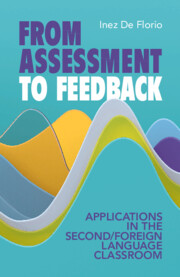Book contents
- From Assessment to Feedback
- From Assessment to Feedback
- Copyright page
- Contents
- TEFL Examples
- Introduction
- Part I Basic Concepts of Assessment and Feedback in the Foreign-Language Classroom
- Part II Assessment and Feedback in Its Different Manifestations
- 5 How to Implement Successful Feedback in Foreign-Language Teaching
- 6 Involving the Learners in Important Decisions
- 7 Feedback Is No One-Way Street
- 8 Peer Feedback Needs to Be Learned
- 9 Self-Assessment
- 10 Collegial Feedback Strengthens Language Teaching and Learning
- 11 What about Electronic Assessment and Feedback?
- 12 Remote and Hybrid Learning
- Part III Summative Assessment in Combination with Formative Feedback
- Glossary
- References
6 - Involving the Learners in Important Decisions
from Part II - Assessment and Feedback in Its Different Manifestations
Published online by Cambridge University Press: 19 January 2023
- From Assessment to Feedback
- From Assessment to Feedback
- Copyright page
- Contents
- TEFL Examples
- Introduction
- Part I Basic Concepts of Assessment and Feedback in the Foreign-Language Classroom
- Part II Assessment and Feedback in Its Different Manifestations
- 5 How to Implement Successful Feedback in Foreign-Language Teaching
- 6 Involving the Learners in Important Decisions
- 7 Feedback Is No One-Way Street
- 8 Peer Feedback Needs to Be Learned
- 9 Self-Assessment
- 10 Collegial Feedback Strengthens Language Teaching and Learning
- 11 What about Electronic Assessment and Feedback?
- 12 Remote and Hybrid Learning
- Part III Summative Assessment in Combination with Formative Feedback
- Glossary
- References
Summary
In order to benefit as much as possible from feedback, students must be involved in important decisions. To achieve a useful level of involvement, students should participate in classroom discources as much as possible. Furthermore, teachers should apply the strategy “No hand up, except for asking a question” and recur to cold calling so that every student has to think about the tasks and activities. The main areas for learner involment are suggestions for learning objectives, fixing success criteria, and using rubrics. Advanced learners can also try to redesign a lesson.
Keywords
Information
- Type
- Chapter
- Information
- From Assessment to FeedbackApplications in the Second/Foreign Language Classroom, pp. 86 - 106Publisher: Cambridge University PressPrint publication year: 2023
